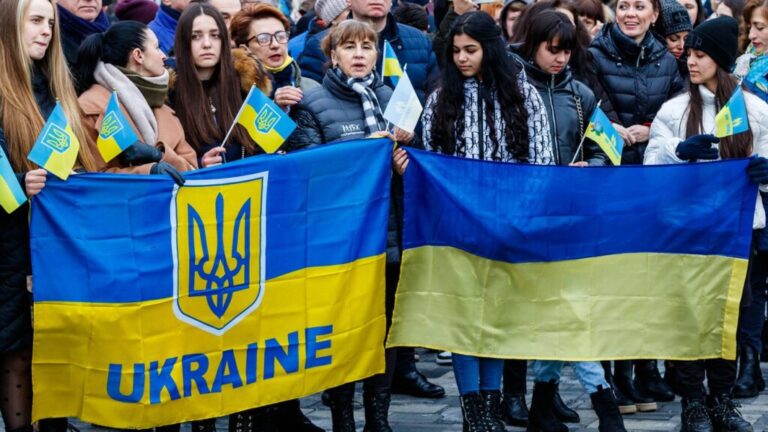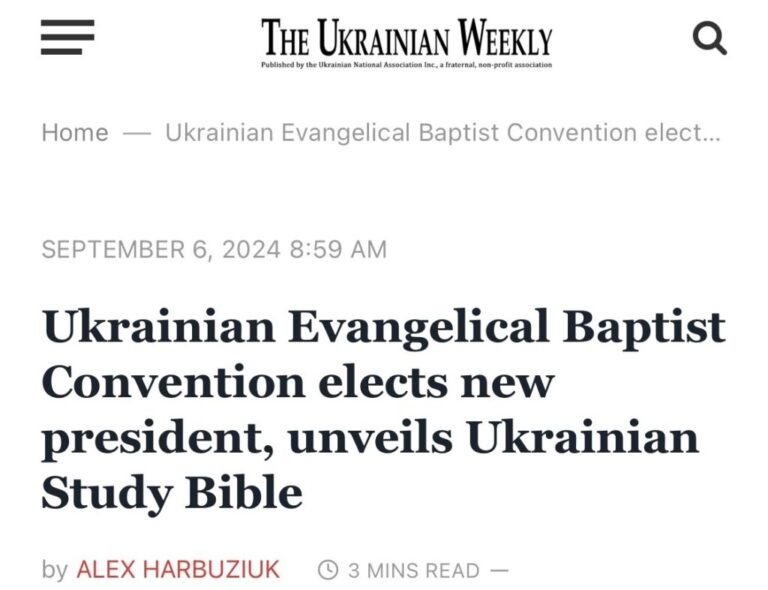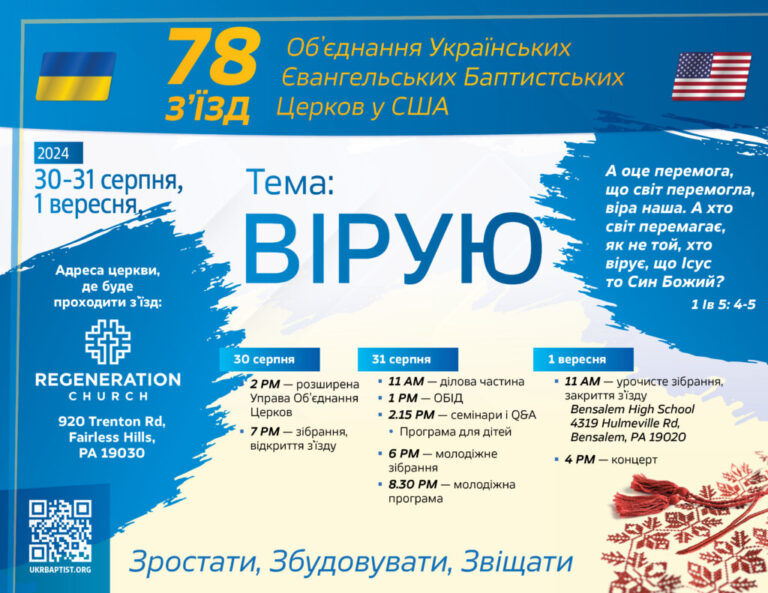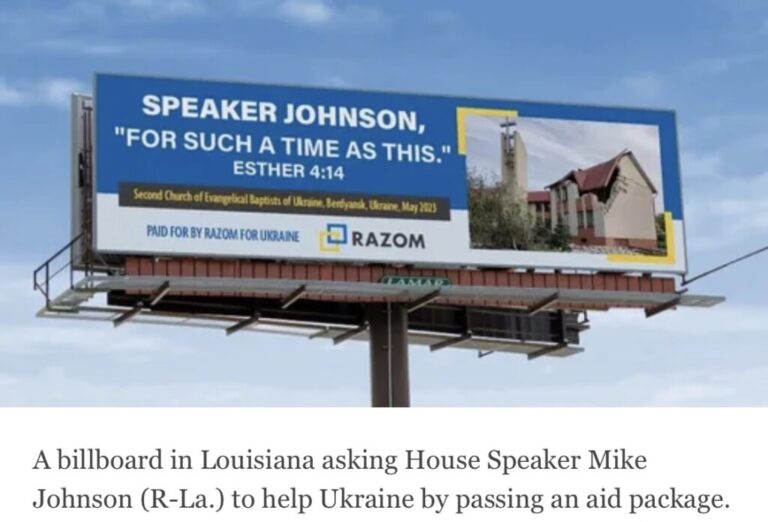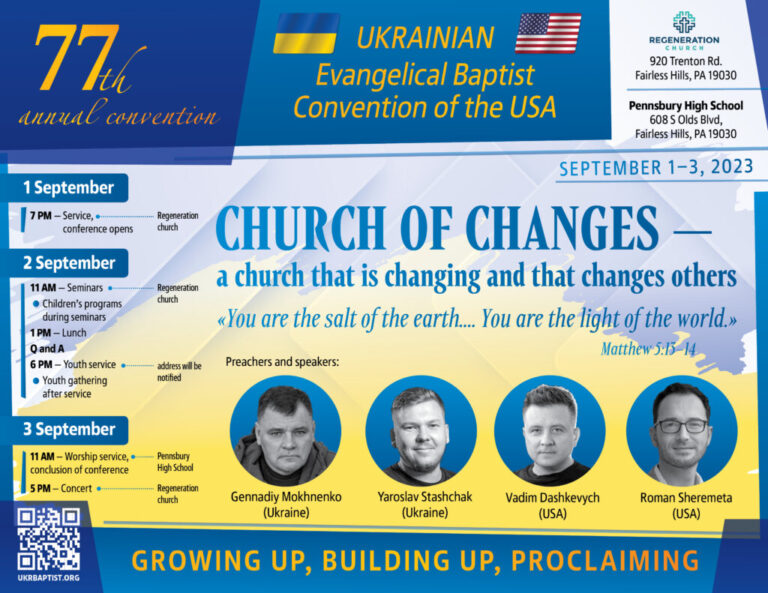Judging Russia’s War with Ukraine
On the first anniversary of Russia’s war with Ukraine, International Mission News published an article by Sarah Eekhoff Zylstra titled “One Year Later, Moscow Pastor Says, ‘I Know God is Going to Judge Us All.’” (https://www.thegospelcoalition.org/article/moscow-pastor)
The reflections below are an attempt to explain why Ukrainian evangelical believers do not agree with the Moscow pastor.
Who will God judge for the war in Ukraine?
The pastor of the Russian Bible Church in Moscow, Evgeny Bakhmutsky, speaks evasively and vaguely when he says, “I know that God is going to judge us all.”
“Us” who? Only “us,” the Russians, who started a barbaric “special military operation” in Ukraine? Or “us” together: the Russians who are fighting in Ukraine, the “collective West” that supplies Ukraine with weapons, and at the same time Ukrainians who are defending themselves?
“All” of whom? All those who support the war? Everyone who does not pray for peace with Russia? All those who hold leadership positions in Russia, including church leaders and pastors who do not condemn the war unleashed by Putin?
Pastor Bakhmutsky, apparently, can see better from Moscow who God will judge for the war unleashed by Russia in Ukraine? It is certain that among “all of us” condemned there will be those who, like Pontius Pilate, “washed their hands,” thinking they are innocent of the spilled blood, and this applies to the evangelical Christians of Russia.
Faith and politics
“The Russian Union of Evangelical Christian Baptists is watching the events taking place on the territory of Ukraine with pain in the heart” is all that the president of the RUECB, Peter Mitskevich, managed to say about the war in Ukraine. They merely “watch” how cities and villages in Ukraine are destroyed, how children die, how their brothers and sisters are abused by soldiers of the Russian army in the occupied territories, because, according to Mitskevich, “military actions always bring suffering and death.” (1)
Russian evangelical Christians not only observe suffering and death in Ukraine “with pain in their hearts,” but also pray for peace. “We as a religious organization (Christ’s church),” says Mitskevich, “fulfilling our mission on earth, do not give political evaluations to one or another of the participants in the conflicting parties, but call everyone to peace and love of humanity. This is what our churches are praying for strenuously.”
What, from Mitskevich’s point of view, is the purpose of Christ’s church on earth? First of all, apparently, to be faithful to the Lord, but definitely not to give political evaluations. The war unleashed by Russia in Ukraine — this is between conflicting parties. Evaluating murders, torture, rape, destruction, devastation, abuse on the territory of Ukraine – this is politics. And what then is faithfulness to the Lord? Faithfulness to the Lord – it’s to be submissive to the authorities.
This approach to “one’s purpose on earth” is nothing more than the influence on evangelical Christianity by Russian Orthodoxy. And the official position of Russian evangelical churches and pastors on the war in Ukraine completely coincides with the position of the Russian Orthodox Church and Moscow.
Aid for refugees
In the first weeks and months of the war, Russian evangelical believers helped Ukrainians fleeing from the war zone. At that time, about three million Ukrainians crossed the border into Russia. For many Ukrainians, it was the only way to escape from the hell of war.
“We had dozens of people, especially in the beginning,” Bakhmutsky says. “Some were asking us to help them remain in Russia. We helped many of them get to Europe. We were buying them tickets or driving them to the Russian border and giving them some money.” The Russian Bible Church of Bakhmutsky eventually helped hundreds of refugees from Ukraine.
Helping refugees in the first days of the war for many Russian Christians meant being a “Good Samaritan”: being on the side of good, light and justice. However, it soon became clear that helping, praying, and even being against the war does not at all mean being with your “brothers and sisters” from Ukraine.
Hateful comments
Despite the sympathy and effective assistance to Ukrainian refugees at the beginning of the war, the pastor from Russia testifies that “I get hate comments every day.”
“Conflicts within the church have been very painful,” Bakhmutsky says. “Probably the most painful thing to see was the brothers and sisters who loved and ministered with each other start to lose each other.”
Sarah Eekhoff Zylstra, editor of the Gospel Coalition, wrote in an article: “Furious and scared, Ukrainian Christians have blasted him [Bakhmutsky] for not doing more to publicly condemn Russia’s actions, for choosing to stay in Moscow, even for being Russian.”
Today, when the war in Ukraine has been going on for 450+ days, why are Ukrainian Christians criticizing Bakhmutsky, Mitskevich, evangelical unions and churches in Russia?
Under the sign ‘Z’
Evangelical Christians in Russia do not recognize that they live under the Z sign (the Z sign is a symbol of the Russian invasion of Ukraine).
An artist from Russia (living in exile), Katya Margolis, made an interesting observation: In a photo of Gorbachev’s funeral, there was a long queue of people who mourned not only Gorbachev, but also the hopes for the democratic development of the country that they once had. So, in the photo – most likely depicting a queue of decent and honest people – it turns out that they are all standing under a huge Z sign, and this Z sign is visible only to the observer. (2)
Today there exists no “good” or “bad” Russia, but there is a sick “empire” under the sign Z, where even good evangelical ministers are not immune from this chronic imperial disease.
Any permitted activity in today’s Russia, including religious ones, directly or indirectly demonstrates the normalization of the abnormal, and tries to convince everyone that life goes on, and nothing special was happening in the cities of Bucha, Irpin, and Izyum.
‘Russian soul’
Evangelical Christians in Russia see the war launched by Putin in a neighboring country as a cleansing of “filth.”
Didn’t Putin start the war in order to cleanse Ukraine of “sin” and “impurity”? Didn’t Putin start a war in Syria to protect the Christians there?
On June 28, 2021, the Russian Union of Evangelical Christian Baptists organized an official reception in honor of Franklin Graham’s arrival in Russia at the Four Seasons Hotel in Moscow. At the reception, the president of the Billy Graham Evangelistic Association thanked Putin for saving Christianity in Syria. “If Russia had not intervened in the situation in Syria, I think that there would not be a single Christian church left, and I am grateful to the Russian president for the decision he made.” (3)
At the time when Western Christians brought the Gospel to Russia after the collapse of the Soviet Union, Russian propaganda spread the narrative of “Russian messianism” and distorted Western “values,” and evangelical Christians bought into this provocation.
Western Christianity also did not understand that the “Russian soul” and Russian spirituality are fake and illusions. Dr. Michael Cherenkov, pastor of the “Revival” church in the state of Washington, says that with the help of the Gospel, Western Christians tried to cultivate the Russian nation, to make the Russians kinder and more civilized.
“Missionaries came to Russia very naive. Instead of understanding the real, that is, the terrible spiritual state of society, they were fascinated by Orthodox spirituality,” Cherenkov says.
“Instead of calling everything by its name and helping this unfortunate people to see and repent, the missionaries ‘contextualized,’ adapted and justified this distorted reality as the norm. The inflating of the Russian sacred ‘ego’ by Western Christians has brought a lot of harm.”
Michael was born and lived in Russia, so he knows well the behind-the-scenes side of this process, which turned out to be an imitation of democratization, civilization, and evangelization.
Fear, according to the Holy Scriptures, is a sin, and self-intimidation is certainly not beneficial for evangelical Christianity.
Fear and the power of preaching
Evangelical believers in Russia are afraid to tell the truth about the war and they intimidate themselves.
During the war, Pastor Bakhmutsky has been rereading Dietrich Bonhoeffer and agrees with his statement that “the best answer to totalitarianism is preaching Christ.” It seems that Pastor Bakhmutsky is ready to admit that totalitarianism exists in Russia. “If I could go to the Kremlin or Red Square and do anything to stop it, I would,” the pastor said.
For certain reasons, Pastor Bakhmutsky did not dare to go to the Kremlin (or Red Square), but this is not what causes the condemnation by Ukrainian believers. Not every Christian has the courage to take risky and heroic actions. However, it is difficult to understand why the Christians of Russia intimidate themselves and force themselves to remain silent about the war, when they are in no danger and when they can continue to preach the Gospel.
According to Bakhmutsky, some of the 400 members of the Russian Bible Church have rethought or regained their faith this year. “Our church services have never been so joyful,” he said.
We can talk about the effectiveness of preaching the Gospel only when the truth has made the preacher free, when he is not afraid of himself, when he is not afraid to take responsibility, as evidenced by the life and death of Bonhoeffer himself.
Christian or Russian?
Under the guise of Christianity, the evangelical believers of Russia want to absolve themselves of responsibility for the war that their country has unleashed.
Ukrainians began to perceive themselves through the lens of Russia’s war of aggression against Ukraine. What we understood before has now become obvious. The consequences of this terrible destructive war, which was unleashed by Russia, became obvious.
An important question is what each of the evangelical believers emphasizes. Bakhmutsky says: “Yes, I am Russian. But I am more Christian than Russian.”
The expression “more Christian than Russian” sounds convincing and admirable, but everyone is always tempted to say something that sounds more “spiritual” and “holier” than it really is.
If your evangelical Christianity is a greater priority than your nationality, then first of all you should call things by their names, as the Gospel teaches: “yes – yes” or “no – no” and not be afraid to call truth – truth, evil – evil, white – white, and war – war. And secondly, if you are not ready to take responsibility that it is also your fault that your country crucified Ukraine with war, and you cannot say “I pray that Ukraine will win,” then do not say that you are more of a Christian than a Russian when you don’t put “your Christianity” first.
Victims of war
Russian evangelical believers position themselves as victims of the war.
Russian Christians, together with Ukrainian Christians, say that this war has affected each of them: “we are all at war”; “this war is against each of us”; “we are also victims of war.”
Becoming a victim in today’s Russia – this is a reality for every citizen of Russia, and it must be recognized that this reality became possible thanks to the compromises of evangelical believers with the Russian authorities.
“Russian Christians,” according to Michael Cherenkov, “are not victims of war, but victims of a great desire to adapt and of little love for the truth. The desire to adapt always begins with small compromises, and it is only a matter of time when the question will arise before every Christian: What are you ready to give for your truth: well-being, freedom or life? The fear of losing one’s place in this totalitarian system prods one toward compromise and conformism. You can consider yourself a victim if forced to follow this pernicious path, unquestioningly ready to accept the standards set by the majority and unconditionally bow to the authorities. But isn’t such a victim an accomplice in the crimes of the system of which he became a part or allowed himself to commit?”
‘Elder Brother’
Evangelical Christians in Russia do not want to realize that the war has changed the relationship between them and Ukrainian Christians.
Bakhmutsky remembers how it used to be: “Ukrainian and Russian church leaders held conferences together, swapped pulpits, and shared theological resources. The two were so close that if a theological resource was available in Russian, barely anybody bothered to do a separate Ukrainian translation.”
Is it no wonder that the relationship between Ukrainian ministers and Russian ministers from the aggressor state changed when, from 2014, the Russian Bible Church headed by E. Bakhmutsky (together with other Russian churches) began to organize and conduct meetings in the annexed Crimea and in the territories occupied by Russia, thereby recognizing the “legality” of such activities?
Rethinking
It would not hurt Russian evangelical Christianity to keep quiet for a while and rethink its position. This is a normal phenomenon, if today they are not invited to joint conferences and are kept at arm’s length. Of course, it is not easy to realize that suddenly you are no longer the elder partner and are no longer at the center. You don’t need to convince anyone that you are against Putin and for Ukraine. Instead, help people in Ukraine, because they protect not only their land, their freedom and their children, but also the world from an evil invader. As much as you can, bring victory closer!
Step aside and wait. Be quiet. And listen to what Ukraine says. The Ukrainian voice is more important now.
Footnotes:
1 https://baptist.org.ru/news/main/view/article/1647815
2 https://www.svoboda.org/a/katya-margolis-pora-ponyatj-chto-zhertva-seychas-eto-ne-rossiyane-/32352088.html
3 https://baptist.org.ru/news/main/view/article/1598717
